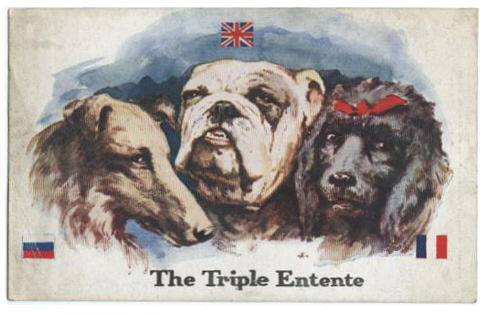
And until World War II, of which it was the primary cause, the "Great War," as it was known at the time, was the bloodiest in history. About 9 million soldiers and 7 million civilians were killed between Aug. 4, 1914 and Nov. 8, 1918.
The world in August, 1914 was very different from the one we live in. There were just 62 sovereign states then, compared to 196 today. Most of Africa and Asia were divided up among European empires, of which the German, Russian and Austro-Hungarian were ruled by kings. Virtually all of the Middle East was ruled by a Turkish caliph in Istanbul. But nearly all of our geopolitical troubles today stem from the Great War and its immediate aftermath.
Kaiser Wilhelm of Germany (1859-1941) was the grandson of Queen Victoria (1819-1901), first cousin to King George V, second cousin to Czar Nicholas II of Russia (1868-1918), first cousin to his wife, Czarina Alix of Hesse. More of German than of Russian descent, Czar Nicholas was also a first cousin of King George V, and of the kings of Norway and Greece.
Their relationships didn't prevent these monarchs from blundering into a war none of them wanted, or from continuing it to the ruin of their countries after the expectations each had for a quick victory were dashed.
The trigger was the assassination June 28 of the Archduke Franz Ferdinand, heir to the throne of the Austro-Hungarian empire -- which included what are now the nations of Slovenia, Croatia, Bosnia, the Czech Republic, Slovakia, much of Romania and a chunk of Poland -- by a Serbian nationalist in Sarajevo.
Austria mobilized its army to punish Serbia. Russia mobilized to protect its fellow Slavs. Germany mobilized on behalf of its ally, Austria. France mobilized because Germany was mobilizing.
When Germany invaded Belgium — through which its armies had to pass to strike France — Aug. 4, Britain declared war. Canada, Australia and New Zealand swiftly followed the mother country. Japan — spying an opportunity to seize German holdings in China — joined the Allies Aug. 23. Hoping to gain territory at Russia's expense, the Ottoman Turks joined the Central Powers Nov. 1. Italy — seeking to gain territory at Austria's expense — joined the Allies in 1915.
Combatants died in droves, thanks to military stupidity. Generals on both sides ordered bayonet charges against machine guns, with predictable results that somehow they never foresaw.
After the German offensive petered out during the First Battle of the Marne (5-12 Sep.) the war settled into a bloody stalemate which lasted for four more years. Though nearly an entire generation of young men in Britain, France and Germany was being wiped out, their economies were in ruins, political leaders lacked the brains, or the guts, to make peace.
The arrival in France in 1918 of large numbers of American troops brought the Allies decisive victory. (Angered by submarine attacks on our shipping, and a clumsy German attempt to get Mexico to attack us, we'd entered the war the year before.)
Our intervention may have been unfortunate, because the draconian peace the Allies imposed sowed the seeds of World War II. The borders of the nations in the Middle East carved from the corpse of the Ottoman Empire were drawn more for the convenience of Britain and France than for the benefit of the peoples who lived in them. Conflicting promises made to Arabs and Jews haunt us today.
World War I spawned Communism in Russia, Fascism in Italy, National Socialism in Germany. It reawakened an Islamic fundamentalism slumbering for generations. Among the 20 nations in which there was significant fighting, there was really only one winner. A middling power in 1914, the United States was the world's only superpower in 1918 — because the great empires had committed suicide.
Comment by clicking here.
JWR contributor Jack Kelly, a former Marine and Green Beret, was a deputy assistant secretary of the Air Force in the Reagan administration.



 Contact The Editor
Contact The Editor
 Articles By This Author
Articles By This Author